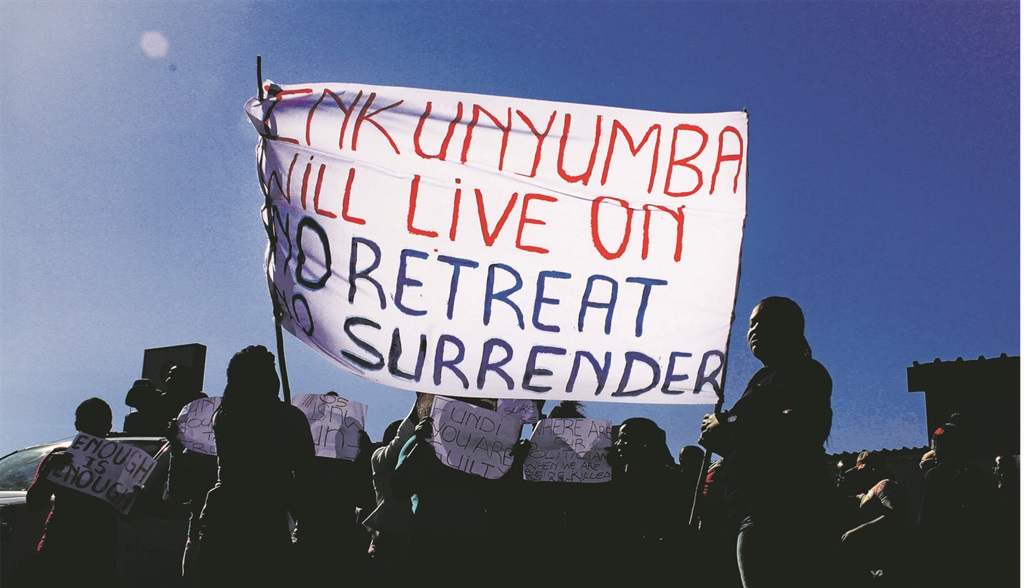
Despite its political rhetoric about land restitution, including by expropriation without compensation, the government is turning a blind eye to continuing dispossession and the violence accompanying it.
In Xolobeni, Eastern Cape, the anti-mining sector continues to stand firm, despite the death of a leader, attacks and threats.
In KwaZulu-Natal people in rural communities opposing mining not only have to deal with traditional leadership seduced by mining firms, but with the Ingonyama Trust, which ignores its mandate to act in the interests of communities and grants leases that negatively affect the people.
Despite government contestation, it has also claimed mining royalties.
Rural communities around Mtubatuba, Mtunzini and Richards Bay, where there are coal and titanium mines, are being dispossessed of their land, have polluted water and are suffering from respiratory illnesses.
In the area bordering the iSimangaliso Wetland Park, a World Heritage site, Eyamakhosi Resources recently applied for prospecting rights for rare earth minerals.
There are plans to dig a deep well to store a huge quantity of carbon gas emissions on traditional land south of Kosi Bay.
Urgent answers and interventions are needed in Mpembeni, south of Richards Bay, where people are resisting moving to make way for what they have been told are “oil-related developments”.
At least four people have been killed in the past two and a half months and attackers could strike at any time.
THE CRISIS IN MPEMBENI
Mpembeni is part of the Kwa Dube traditional authority area where Richards Bay Minerals (RBM) has been mining titanium and rare earth minerals for the past few years.
Last year men described as being from “overseas” were seen surveying another part of Mpembeni and taking aerial photographs.
Locals have been told that some of the residents will need to move from their homes for mining-related activities, for which the king has given his approval.
Traditional authority structures are allegedly divided and driven by corruption, which locals claim is linked to the death of ANC official Sifiso Mlambo in January.
There are no known oil-related activities in this area apart from an application by EMI and Sasol to prospect offshore, which is nowhere near finalisation.
So, what is going on? Despite concerted attempts to obtain information, no one is telling.
An initial letter sent to provincial and national government departments on July 5 and follow-up letters – especially to the cooperative governance and traditional affairs department in KwaZulu-Natal – remain unanswered.
Emails to the Ingonyama Trust were returned to the sender.
The killings started four days after the first letter was sent, when Geshege Nkwanyana was shot on July 10. Ntuthuko Dladla’s killing followed three days later.
It is suspected that trained hitmen were used. On September 16 Khaya Ncube was shot dead and two days later another man opposed to moving narrowly missed being killed.
On September 26 Keke Ngwane was shot dead at lunch time at the nearby eSikhawini shopping mall.
The common thread in these attacks and continuing threats to associates of the deceased is that they involve residents who oppose moving.
They know that those who were persuaded by RBM to move for the titanium mining have been financially short-changed and they do not want to lose the precious land on which they grow food and keep livestock.
They are angry that some of the Kwa Dube land “belongs” to prominent politicians who have been given leases.
They are determined not to move but they are living in fear and wonder who will be killed next.
GOVERNMENT CULPABILITY
The biggest stumbling block to transparency about developments on traditional land in KwaZulu-Natal is the Ingonyama Trust, which makes a great deal of money issuing leases for land, the constitutional rights of which are vested in its residents.
But, they say, some autocratic leaders lack any sense of accountability and, sometimes in collusion with corrupt local government officials, might take decisions that are not in the interests of their subjects – especially given huge inducements offered by mining companies.
It is their subjects who suffer and receive no support from the government.
That is what is happening in many parts of the province where mining is taking place, or where the threat of mining looms.
The trust has presumably given a lease to some entity to engage in further mining-related operations in Kwa Dube (and in KwaSokhulu near iSimangaliso and KwaTembe) but their decisions are opaque.
The actions of the trust create the impression that it is a law unto itself, despite being subject to Parliament, the government and the Constitution.
Does the trust not realise that by maintaining a veil of secrecy it facilitates the actions of whoever is behind the killings – especially as there are probably many well-connected people with vested interests in whatever is planned for this area?
The same applies to provincial and national government departments which presumably know why people are being told they will need to move.
People who were planning public protests in July were cowed into silence.
Covert forces are sending a clear message that it is dangerous to oppose moving, yet government departments have refused to provide information to which Kwa Dube residents, and the public, are entitled in terms of section 32 of the Constitution?
Why? Collusion in dispossessing people of their land exposes the hypocrisy of the government’s land restitution rhetoric – and inevitably invites comparisons with colonial and apartheid dispossession.
De Haas is a land rights activist




 Publications
Publications
 Partners
Partners








